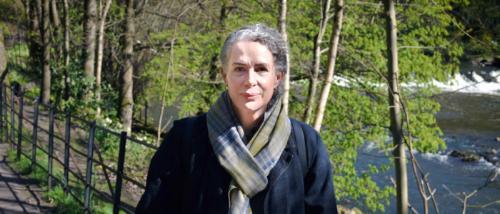Introducing Professor Jude Robinson
Professor Jude Robinson talks about her interdisciplinary research in critical public health. Her current work in Kenya examines how peri-urban communities access safe water, exploring innovative, low-cost solutions through collaboration with microbiologists, epidemiologists, and local creatives.
Tell us about yourself
I am a social anthropologist, and I currently lead the Global Sustainable Development (GSD) theme for the ARC. We are uniquely drawn from all four Colleges at the University of Glasgow, with around 40 academic staff and PGRs located on Level 5 of the ARC, alongside a further 70 members from around the university.
While I was at the University of Liverpool (1995–2018), I worked in the Faculty of Medicine for over 15 years, which was a great place for me to develop my research. Working outside an anthropology department forced me to engage with the challenges of other disciplinary practices, and to connect with anthropologists and social scientists across campus. This has contributed to the interdisciplinary nature of many of my projects, which often involve collaboration with external partners in health, social care, and NGOs.
Most of my research has been UK-based, but during my time at Liverpool, I became a core member of the Global Health group. This led to successful applications to the UKRI Global Challenges Research Fund (GCRF), enabling collaborations with colleagues in Ethiopia, Eritrea, Kenya, Rwanda, Somalia, and Uganda. I currently have ongoing projects in both Kenya and the UK.
Anthropologists are fascinated by what people do and say, and I’ve gained invaluable insight and experience through different leadership roles. I was Head of the Department of Sociology, Social Policy, and Criminology (2014–2017) at Liverpool before joining Glasgow in 2018 as Deputy Head of the College of Social Sciences. I am also looking forward to taking up my new role as Research and Knowledge Exchange Lead/Deputy Head of the School for Social and Political Sciences.
How would you describe your research interests and current work to someone new to the subject area?
I research critical public health, focusing on the health of women with young children living on low income, reflected in my title as Professor of Health and Wellbeing. This broad topic allows me to explore diverse areas and theoretical perspectives.
Anthropology is about understanding what it means to be human—how people make sense of their place in the world, what they believe they know, and how this shapes their actions and interactions. My research includes examining how people relate to others, their natural and social environments, and other species, framed through a ‘one health’ perspective.
Currently, my research in Kenya investigates how people in peri-urban communities access water, and its safety and quality. This interdisciplinary project involves microbiologists, medical and veterinary scientists, epidemiologists, and social anthropologists. My role is to explore strategies used in resource-limited settings to improve human and livestock health without harming the environment.
The project draws on theories of health inequalities, climate variability, insecurity, and gender roles. It also looks at people’s beliefs about health and risk perceptions, as well as what they think is necessary to improve water quality in their communities. Over the last five years, we’ve interviewed more than 100 people, following them from homes to streams, rivers, and commercial water collection points to map contamination sources and develop low-cost solutions. Collaborating with local creatives and academic colleagues, we’re producing animations, films, and books to capture and communicate our work.
What would you most like people to know about you?
I value both disciplinary perspectives and interdisciplinary working practices as part of my commitment to tackling global challenges. I enjoy complexity, the 'messiness' of research, and the potential to reconceptualise common problems in ways that bring us closer to solutions.
What do you like most about working at the ARC?
I love coming to the ARC because you never know who you’ll encounter or what conversations you might have. This element of surprise and possibility makes the space both stimulating and challenging.


